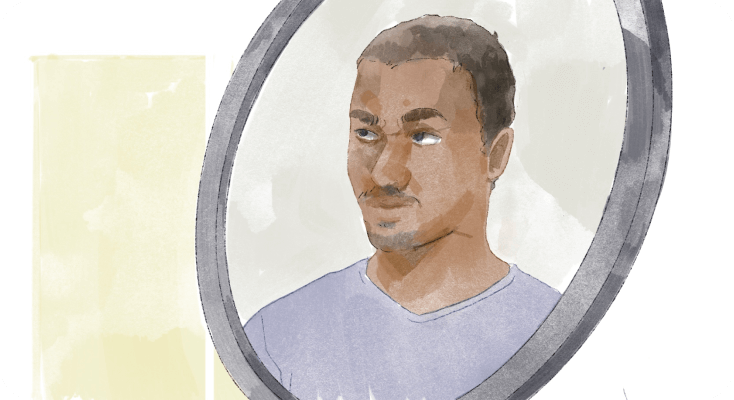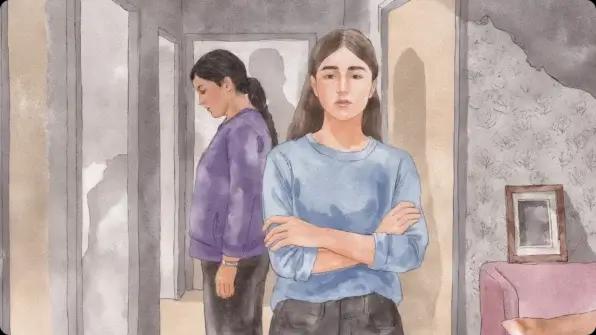“I try to seem perfect in other’s eyes even though I feel that I don’t deserve anything good. My self-esteem is so low that the only way to deserve love is to please everyone. I am anxious about all my actions as I believe that I can’t do anything correctly.”
Do any of these statements sound relatable to you? In fact, this is how children of narcissistic parents can perceive themselves and the world around them.
“But my family was pretty normal! Yes, we didn’t have a strong emotional bond, and sometimes I would like to receive more support, but this is how most people grew up.”
You’re right; many children face this. Still, this isn’t a healthy, nurturing environment that allows children to feel secure, valued, and emotionally supported.
In this article, we’ll try to discover whether you grew up in a narcissistic family, the traits of children of narcissistic parents, and the long-term effects of such childhood on a future person’s life.
What is Narcissistic Parent Behavior?
Disclaimer. Displaying narcissistic traits doesn’t necessarily mean having a narcissistic personality disorder (NPD).
Narcissistic personality disorder is a mental health condition that affects about 6.2% of the US population. Its main characteristics are intense self-centeredness, lack of empathy, belief in superiority, attachment issues, and a strong desire for admiration.
At the same time, narcissistic behavior is much more common. We all strive to be seen and admired, especially by our caregivers. Nevertheless, it differs from NPD in its severity, consistency, and impact on daily functioning and relationships.
So, even if your parents weren’t diagnosed with NPD, it doesn’t mean that narcissistic traits or actions haven’t influenced your childhood.
How do narcissists treat their children?
Even though a narcissistic parent can seem very charming and charismatic at first sight and to others, in reality, such a person can leave emotional scars on loved ones.
Narcissists have low emotional intelligence and struggle to be empathetic. They tend to act selfishly and face difficulty thinking about others. Because of this, they can’t give their children support and validation, which are essential for healthy emotional and psychological development.
Moreover, children of narcissists quite often feel a different attachment to their parents than others. Like an expensive bag or a new iPhone, their children need to be perfect and useful in order to receive any warmth from their parents.
If this doesn’t happen and children aren’t as perfect as expected, narcissistic parents may start being manipulative to make others meet their needs. As a result, an adult child of a narcissist might feel guilty for not being “the best out of the best” and have significant problems with self-esteem.
What else can people who have a narcissistic mother or father experience?
When becoming “too good,” “too independent,” and getting out of their parents’ shadow, they may see another side of the coin. A mom or dad might start competing with a child, trying to be better and attract more attention and validation, which can further damage the child’s mental health.
Last but not least. Children of narcissistic parents have a higher likelihood of their parents avoiding apologies. People with NPD and some with 12 narcissistic traits often find it difficult to appreciate that they are wrong. As a result, they often blame the closest ones, which can lead to a guilt complex.
Signs You Were Raised by a Narcissist
Narcissistic families might seem happy and even ideal in public. These can include an excellent mom who strives to look like a supermodel and a successful dad who purchases a new car every year.
Or, maybe these are those super-friendly neighbors who always spend time together and gather every evening at a family dinner.
Often, it’s difficult to predict how children of narcissistic mothers and fathers live in private. At the same time, the extent of narcissistic behaviors in a family and their intensity depend on which family members exhibit them.
Let’s delve into the mother wound and father wound below.
Narcissistic Mother
As you already understand, some people can’t even guess that they were raised by a narcissistic mother. They find many behavioral patterns normal, even though quite often they are traumatizing.
In a nutshell, narcissistic mothers do everything to praise their egos. They are prone to competitive and controlling behavior, gaslighting, emotional manipulation, and dismissing their child’s feelings, all to maintain their sense of superiority and control.
Do you want to answer the question, “Was I raised by a narcissist? Use the following signs as a quiz.
- Showed little concern for your feelings or needs
- Regularly criticized your achievements and was never satisfied, making you feel like a scapegoat child
- Used guilt trips or emotional blackmail, frequently making herself the victim
- Tried to control all aspects of your life, including your decisions as an overbearing mom
- Manipulated to maintain dominance and authority
- Projected her insecurities onto you
- Chose the favorite sibling and treated him or her differently, which could cause a golden child syndrome
True to say, the list can be much longer. Nonetheless, it’s vital to keep in mind that most mothers don’t show all these traits — the more pronounced the narcissistic behavior, the deeper the impact on the child’s well-being.
For instance, daughters of narcissistic mothers and daughters of narcissistic fathers often experience self-esteem issues and may find it challenging to establish healthy boundaries in their relationships.
Narcissistic Father
How do children of narcissistic fathers feel most of the time? They are constantly seeking love, approval, and attention.
Such dads may take little interest in what their children like. Thus, spending little to no time with family and exploiting children to please their egos might happen quite often.
Let’s delve into the most common signs you were raised by a narcissist.
- Demanded praise and validation and became upset when ignored
- Dominated family decisions, and everyone should’ve behaved as he wanted
- Regularly criticized all family members, including mother
- Disregarded the boundaries of everyone around
- Craved attention and always tried to be the heart of the team
- Avoided responsibility and often blamed others for his mistakes
- Expected to be recognized as exceptional
As a result, adult children of narcissists, especially fathers, can find it difficult to acknowledge their success, as they feel “not enough” for their parents.

Traits of Adults Raised by Narcissists
Living with people with NPD or narcissistic tendencies quite often leads to consequences for mental health later in life.
Do narcissists raise narcissists? It’s a double-edged sword. Narcissism in children of people with NPD might happen, and they may start wondering, “Am I manipulative?” However, controversially, they can live with low self-esteem, anxiety, and people-pleasing tendencies, wondering, “Why do I attract narcissists?”
As we already understand how people who inherited narcissism from their parents can behave, let’s take a look at the second category. Here’s the list of traits that people who experienced narcissistic parental abuse may live with.
- Constant insecurity and self-doubt
- Trust issues and difficulties with building relationships
- Self-loathing
- Perfectionism
- Tendency to enter into toxic relationships
- Difficulties with understanding and regulating emotions
- Worrying about everything
- Sensitivity to criticism
If you’ve seen The Crown, Netflix’s historical drama, you can remember Princess Margaret’s behavior. This character clearly shows narcissistic child symptoms.
She constantly struggles for approval, experiencing self-worth issues and emotional challenges. Growing up in a royal family shaped her personality, leaving her in perpetual conflict with her self-image and emotional well-being.
Long-Term Effects On Adult Children of Narcissistic Parents
“Children of narcissists learn that love is abuse. The narcissist teaches them that if someone displeases you, it is okay to harm them and call it love.” ― M. Wakefield, Narcissistic Family Dynamics: Collected Essays.
This quote can sound familiar to most children of narcissistic parents. Still, while the book by M. Wakefield includes essays about living in such families, let’s go a bit further.
Below, we’ll enlist the effects that a child of a narcissistic parent might experience in adulthood.
- Imposter syndrome. Low self-esteem often leads to the fact that children of narcissists experience challenges in recognizing their worth. They might live with a fear of being exposed as incompetent despite all previous accomplishments.
- Professional сhallenges. Consequently, adult children of narcissists have difficulties getting promotions and growing in their careers. They believe they don’t deserve any salary raise, and it isn’t worth trying.
- Difficulty in romantic relationships. Quite often, in narcissistic families, children need to assume the role of parents toward their own parents. Such a parentified child may unconsciously try to become a “mum” or “dad” for future partners as well.
In another scenario, adults can be attracted to unhealthy relationships that mirror their childhood dynamics. They might struggle with intimacy and vulnerability, which can cause problems in their love life.
- Fear of abandonment. As children of narcissistic mothers and fathers used to deserve love, they might feel scared to be rejected by their loved ones. They are overly dependent on the behavior of their partners and can start getting nervous even after a minor miscommunication.
- Difficulty setting boundaries. “No” might be something like a taboo word for children of narcissists. If you’re the one, you may find yourself in situations where you feel obligated to say yes, even when it goes against your own needs. Such people have trouble establishing personal boundaries, as their parents didn’t allow them to do so in childhood.
How to Deal with Narcissistic Parents?
The best way is to recognize that you aren’t dependent on those people anymore. Adult children can build their lives and break the cycle of constant guilt. Setting boundaries is crucial for people from such families.
Ian Pearson MA, BCBA, LBA, states, “If you grew up with a parent with narcissistic tendencies or currently find yourself in this situation, you don’t have to tolerate it. It is completely valid to set boundaries and to uninvite them from celebratory moments. The most important thing is to establish a support system with others who will celebrate your accomplishments and allow you to practice reciprocating. While these parental wounds can have lasting consequences, please remember that “found family” is just as valid and can be better for you when you find yourself with a narcissistic family member.”
If you find it difficult to understand and manage your feelings, reaching out to a therapist can be helpful. Additionally, you can get a 28-day emotional intelligence plan to elevate your understanding of your emotions and develop healthier coping strategies. All you need to do is take a free EI test from Breeze.
Disclaimer
This article is for general informative and self-discovery purposes only. It should not replace expert guidance from professionals.
Any action you take in response to the information in this article, whether directly or indirectly, is solely your responsibility and is done at your own risk. Breeze content team and its mental health experts disclaim any liability, loss, or risk, personal, professional, or otherwise, which may result from the use and/or application of any content.
Always consult your doctor or other certified health practitioner with any medical questions or concerns
Breeze articles exclusively cite trusted sources, such as academic research institutions and medical associations, including research and studies from PubMed, ResearchGate, or similar databases. Examine our subject-matter editors and editorial process to see how we verify facts and maintain the accuracy, reliability, and trustworthiness of our material.
Was this article helpful?







